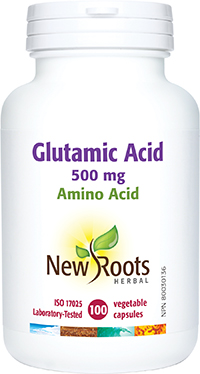-
Products
CategoryGender / Life StageHealth BenefitsRecommendedNew Products Amino Acids / Proteins Antioxidants Enzymes Essential Fatty Acids Exotic Skin Oils Functional Foods Glandular Extracts Herbs and Herbal Extracts Keto Diet Medicinal Mushrooms Probiotics Vitamins / MineralsBlood Glucose Management Cardiovascular Health Detoxification Digestive Health Energy Hair / Skin / Nails Immune Health Muscle / Bone / Joint Health Neurological / Memory Health Sport Nutrition Stress / Mood / Sleep Weight ManagementChoosing Your Probiotics Boost Your Immunity Vitamin D Studies How Healthy is Your Prostate? How Is Stress Affecting You? Magnesium—A National Deficiency Choose to Care - Vitamin D to Ukraine Exotic Oils for Exquisite Skin Medicinal Mushrooms Don’t Let Pain Stop You! Let us solve the O‑MEGA problem! Essential Oils
- About Us
- Flourish
-
Stores
Glutamic Acid
Code 0671
UPC: 6-28747-10671-9
NPN: 80030136
Format: Vegetable Capsules
Amino Acid
 Find Local Stores
Find Local Stores
Description
Glutamic acid is beneficial for the maintenance of good prostate health, muscle recovery, and brain function.
Glutamic acid is a nonessential amino acid used by the body to manufacture human protein, a vital component of all the body’s cells. This amino acid is labeled “nonessential” because, when the acids are lacking in the diet, the body can manufacture them. All nonessential amino acids must be on-hand before the body can synthesize protein; several have additional, more specialized roles as well. Glutamic acid is biosynthesized from a number of amino acids, including ornithine and arginine. When aminated, glutamic acid forms the important amino acid glutamine. Because it has a carboxylic acid moiety (functional group) on the side chain, glutamic acid is one of only two amino acids (the other being aspartic acid) that has a net negative charge at physiological pH. This negative charge makes glutamic acid a very polar molecule, and it is usually found on the outside of proteins and enzymes, where it is free to interact with the aqueous intracellular surroundings.
It is an organic compound, one of the 20 amino acids commonly found in animal proteins. Only the ʟ stereoisomer occurs in mammalian proteins. Like aspartic acid, glutamic acid has an acidic carboxyl group on its side chain, which can serve as both an acceptor and a donor of ammonia, a compound toxic to the body. Once glutamic acid has coupled with ammonia, it is called glutamine and can as such safely transport ammonia to the liver, where the ammonia is eventually converted to urea for excretion by the kidneys. Free glutamic acid (not incorporated into proteins) can also be converted reversibly to ketoglutaric acid, an intermediate in the Krebs cycle, and as such can be degraded to carbon dioxide and water, or transformed into sugars. The acidic side chain of glutamic acid confers one negative charge under most conditions to proteins in which this amino acid is found, thus increasing the water solubility of the protein.
Glutamic acid is an important excitatory neurotransmitter, necessary in the metabolism of sugars and fats, and supports prostate function.
Directions of Use
Adults: Take 3 capsules daily with meals and water or as directed by your health-care practitioner.
Ingredients
| Each vegetable capsule contains: | |
| ʟ-Glutamic acid | 500 mg |
| Other ingredients: Microcrystalline cellulose, vegetable magnesium stearate, and silicon dioxide in a non-GMO vegetable capsule composed of vegetable carbohydrate gum and purified water. | |
Warnings
Contains no: Gluten, soy, wheat, corn, eggs, dairy, yeast, citrus, preservatives, artificial flavour or colour, starch, or sugar.
Cautions and warnings: Consult a health-care practitioner prior to use if you are pregnant or breast-feeding.
Contraindications: May cause gastrointestinal discomfort.
Keep out of reach of children.
Disclaimer
| Code | Format | Size |
|---|---|---|
| 0671 | Vegetable Capsules | 100 capsules |

